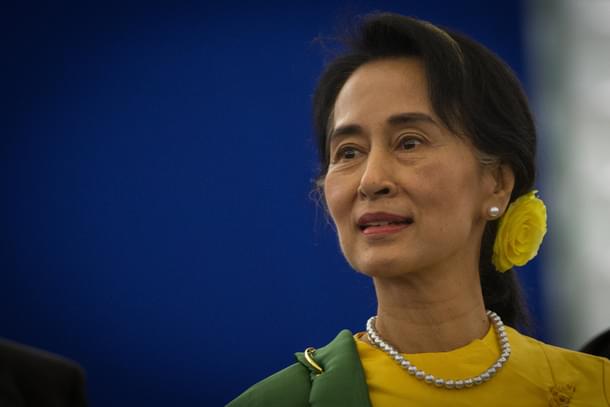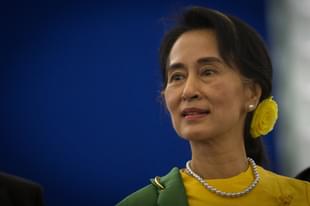World
Military Takeover Of Myanmar: China Suspected To Have Orchestrated Coup To Re-Establish Its Grip On The Country And Its Resources
Jaideep Mazumdar
Feb 01, 2021, 05:50 PM | Updated 05:50 PM IST
Save & read from anywhere!
Bookmark stories for easy access on any device or the Swarajya app.


Myanmar’s military, known as the ‘Tatmadaw’, seized power through an early-morning coup on Monday (1 February), and installed vice-president U Myint Swe, a former general, as the country’s president.
State counsellor Daw Aung San Suu Kyi, who also heads the National League for Democracy (NLD), and the country’s president U Win Myint, as well as many NLD lawmakers, were detained by the military hours ahead of the inaugural session of the newly-elected Parliament.
The Tatmadaw, in a statement (read it here) said the declaration of emergency for one year was necessitated by inaction on the part of the (NLD) government and the Union Election Commission (UEC) to explain allegations of large scale fraud in the Parliamentary polls held on 8 November last year.
Myanmar’s military, and the Union Solidarity and Development Party (USDP) that it backs, have been alleging electoral fraud and had demanded that the parliament session scheduled to start from Monday be kept in abeyance.
On 26 January, the Tatmadaw released voluminous documents that purported to show 10.5 million cases of fraud in the electoral rolls.
The UEC, which conducted the polls, rejected the allegations and said that the electoral rolls cited by the military were not the ones that were used in the elections.
The NLD has won 396 of the 476 seats in Parliament while the military-backed USDP won only 33 seats.
Myanmar’s military chief Min Aung Hlaing had hinted at a military takeover last Wednesday (27 January) when he told senior generals that the country’s Constitution would be revoked if laws are not followed properly.
Since then, the Tatmadaw has been threatening to take action if the government and the UEC did not address allegations of voter fraud.
The Tatmadaw, which ruled Myanmar for five decades until 2015, had demanded that the 8 November polls be declared void and fresh elections under its supervision be held.
The NLD had registered a landslide victory in the 2015 polls as well, but the government’s functioning was often hamstrung by opposition from the Tatmadaw, which reserved 25 per cent of the seats in Parliament for itself under the 2008 Constitution that it drafted under immense international pressure.
The Build-Up To The Coup
Soon after the election results were announced, the USDP, which suffered a humiliating defeat, started levelling allegations of anomalies in the electoral rolls.
USDP leaders said that the rolls contained names of millions of fictitious voters. They allege that the rolls also had duplicate names of voters, and all that allowed the polls to be rigged in favour of the NLD.
Soon after, some of the minor parties which contested the polls but fared badly also started levelling the same allegations.
However, international observers who monitored the electoral process expressed satisfaction and ruled out any large scale anomalies (read their reports here and here).
Of the 90-odd parties which contested the polls, 17 complained of malpractices and all except the USDP are minor ones representing various smaller ethnic groups.
It is widely suspected that these smaller parties like the Shan Nationalities Democratic Party and the Kayin People’s Party were egged on by Beijing to raise doubts about and discredit the 8 November elections.
China has close links with groups and parties representing small ethnic groups in Myanmar, especially those inhabiting the eastern part of Myanmar bordering Yunnan province of China.
China has aided and armed insurgent groups representing these ethnic groups who want greater autonomy over their own areas (read this).
China has followed a duplicitous policy in Myanmar: it has established deep and concrete links with the Tatmadaw while, at the same time, armed and aided the various insurgent groups in that country.
China has also embedded itself deeply in Myanmar’s internal peace process aimed at addressing the concerns of the insurgent groups representing restive ethnic communities.
Chinese representatives take part in peace negotiations and many in Myanmar say that it is China which holds the key to a peaceful settlement of the ethnic problems in Myanmar.
That’s because China controls many of the insurgent groups and, as a major Asian power, also commands a lot of traction in the region.
China had hoped that the USDP and the smaller parties it has major influence over would win a substantial number of seats in Parliament and, with 25 per cent of the Tatmadaw’s nominees, would be able to force the government to adopt China-friendly policies.
But when the NLD registered a landslide victory, Beiijing’s plans got upset. Thus, it started engineering opposition to the poll process by parties in a bid to discredit the outcome of the 8 November polls.
Why China Has Been Unhappy With NLD
China has invested, and plans to invest, trillions of dollars in infrastructure, township, port and energy projects in Myanmar.
As is always the case, these Chinese projects are shrouded in opacity and are designed to yield benefits only to China at Myanmar’s expense.
China had wanted Myanmar to take loans from it at very high rates of interest to finance these Chinese projects. The motive was to ensnare Myanmar in a debt trap and then extract huge benefits, like it did with Sri Lanka in the Hambantota Port project (read this).
But the NLD government had started opposing many Chinese projects and had even suspended a few of them. It also ordered intense scrutiny of Chinese investments in Myanmar.
A number of anomalies, malpractices, fraud and worse about Chinese projects in Myanmar came to light, thus deeply embarrassing Beijing.
At the same time, the Tatmadaw, which operates major business conglomerates like the Myanmar Economic Holdings Limited and the Myanmar Economic Corporation (read about military-controlled enterprises in Myanmar here), also got angry with the NLD government over scrutiny of its business interests and operations.
The NLD government has sought to enforce transparency in the functioning of military-backed business enterprises and hold them accountable. Many of these enterprises had close links with Chinese industrial and commercial entities.
All these made China, and the Tatmadaw as well, unhappy. Both feared that the decisive victory by the NLD in the November elections would embolden Aung San Suu Kyi’s government to impose more restrictions on Chinese projects in Myanmar and bring the Tatmadaw, especially its commercial interests, under greater scrutiny and civilian control.
At the same time, Suu Kyi is a known friend of India and the NLD government had intensified engagement with New Delhi. This also made Beijing, which viewed Myanmar as its own turf, unhappy.
And that is why China encouraged the Tatmadaw to stage Monday’s coup.
Jaideep Mazumdar is an associate editor at Swarajya.




